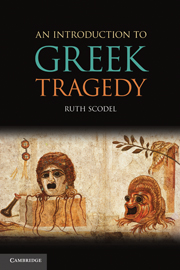7 - Antigone
Published online by Cambridge University Press: 05 June 2012
Summary
Although the larger story within which Antigone takes place was among the most familiar of Greek legends, the tragedy itself had a mostly invented plot. Everyone knew that Oedipus had killed his father and married his mother, although there were many variants on what happened after the truth was revealed, and in some accounts his children were born of another marriage. Then the two sons of Oedipus had quarreled over who would rule Thebes. Polynices, the exiled son, brought together six allies from other Greek cities, but in the attack of the Seven against Thebes, all but one of the Seven were killed. Polynices and his brother Eteocles killed each other. Aeschylus, in his Eleusinians, had dramatized the story that Thebes refused burial to the army of the Seven until Athens intervened. The army is, in fact, left unburied in the play, but the fact is not mentioned until Tiresias warns Creon that the dead men's cities of origin are becoming disturbed (1080–3). Mimnermus, a seventh-century poet, told how Ismene had a love affair with Eteoclus, one of the Seven (the source says with Theoclymenus, but that is almost certainly a mistake), and was killed by another of the Seven, Tydeus, at Athena's command. Haemon, the son of Creon, in the epic Oedipodeia was a victim of the Sphinx, while Creon had another son who died fighting the Seven.
- Type
- Chapter
- Information
- An Introduction to Greek Tragedy , pp. 106 - 119Publisher: Cambridge University PressPrint publication year: 2010



